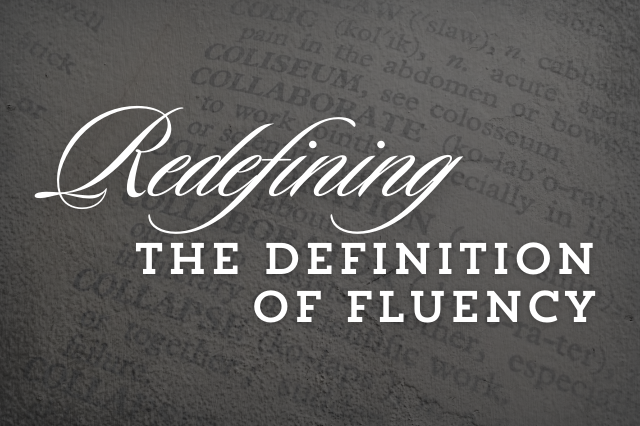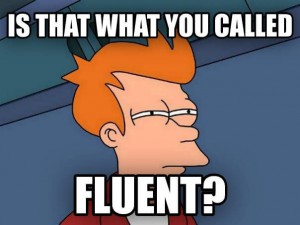
Don’t mind the title. I’m not trying to change what has been written in the dictionary. It’s more of redefining your own definition of fluency. I’ve been chatting for quite a while with lots of my fellow language learners and I noticed a pattern.
If you were to ask people their definition of fluency, I’m sure this would be on the list - to be able to speak smoothly without any mistakes and have a native-like accent.
That’s pretty much the standard definition of fluency and I used to believe in this one too.
However, it changed once I started learning Spanish. You can’t simply label fluency by just that. There are a lot of things you should take into account before determining the definition.
When my friend asked, “So, are you fluent in Spanish now?” I said not really. I can have a basic conversation but that’s about it. This made me question myself.
I argue that fluency shouldn’t be strictly defined by “perfect grammar” or “native-like accent.”
True fluency, for me, means:
Communicating smoothly, even with mistakes.
Being understood, even if you don’t speak perfectly.
Understanding more than you can confidently produce.
I challenge common “what-if” scenarios (e.g., not knowing certain vocabulary) and still conclude these experiences can be part of being “fluent.”
Ultimately, I encourage each learner to define their own version of fluency, not just rely on dictionary definitions or others’ expectations.

What’s my definition of fluency? I realized all this time, I let the dictionary define the definition for me.
Now, it’s time for me to redefine it.
So the idea that, because you speak lots of languages you should be able to say something on request or instantly start up a conversation is wrong. You’re not necessarily going to be able to pull it off, in my opinion. - blog.thelinguist.com
I started to have all of these what-if questions… this is where the “pattern” starts to connect.
I can go on and list the rest of the ‘what ifs’ but these are on the top of my list. My answer to all of the above is yes. Simply because...
The main problem is everyone has their own definition of fluency. Thus, when we say we are fluent in a certain language, they might end up asking “Is that what you called fluently?”
All this confusion happens because our definitions and theirs are totally different. So, who’s to blame? The dictionary?

Another thing people will notice when speaking in foreign languages is the accent. Apparently, some people have a thing for this one (including me).
I kind of brainwash my brain that if you’re not good with grammar, at least, you have to have perfect pronunciation. You may be good with grammar but if your pronunciation is all over the place no one is going to understand you.
This is just from my point of view so please don’t judge me on this one. I’d like to know your perspective on this topic. Let me know in the comment below.
Fadhil says:
It is a great artilce in challenging the definition the word fluent.
For me i think if anyone could talk to anybody in any languages and the other person can understood what are being said where no formality is needed such in an academic forum or governmental meeting that person can already be categorized as fluent.
Meina says:
Hey Fadhil,
I am glad we are on the same page. Some may say if you are not able to respond to the other person because you are not confident of your grammar, you may not able to express yourself well.
It’s true, but I believe that one can acquire their confidence as time passes by. By the way, thanks for your comment.
Ashley says:
Hey there, I really loved your fluency article, I’m a huge fan of languages so obviously, being fluent is something that interests me a lot.
I’ve noticed many times (in my case), that I sometimes can speak that language I’m learning in my mind. It’s like thinking about something, and not doing it in my native language, but in another language. And that is for me a big sign of fluency.
Obviously, speaking without any long pauses and with right pronunciations are the main signs of fluency, the ones I also use as parameters for me.
But thanks a lot for making me think about this, I learned something new today 🙂
Meina says:
Hey Ashley,
I can totally relate to that. I have been doing it like every single day so much so that it becomes a habit. Sometimes, I do not even realize talking to my mom in a foreign language until she made me repeat what I said 😀
When speaking in foreign languages, to me the key is confidence. If you have that, it will help you from having the long pauses.
Thanks for your comments. It makes me happy when someone learns something from my post 🙂
Boyo says:
Hey Meina,
Interesting article that struck a chord with me. I would consider myself fluent in English and in Welsh. I am comfortable and happy to converse, read or write in both languages and can appreciate the different nuances of local dialects etc.
However, my own definition of fluency has begun to change recently. Over the past few years I have been studying French. I am happy in social situations with the French and can comfortably spend a day working in a French speaking office.
But, would I consider myself fluent? No, I wouldn’t. Simply because there are still so many terms that I don’t understand. I can really struggle with legal documents and technical terms etc There are also lots of local language variations and slang words that go over my head! And it is for this reason that I don’t believe I am fluent (perhaps I’m being too hard on myself?)
The concept of fluency is probably a personal thing and it doesn’t really matter too much as long as we are comfortable communicating with each other 🙂
Thanks for sharing.
Meina says:
Hey Boyo,
Thanks for sharing your perspective with us. The way I see it, you are just being hard on yourself. Think of it this way, if some of the native speakers do not know few of the French words themselves, what does that make them? Native but not fluent? Then, what does that make us?
I am a Malay native speaker, heck even I do not know some of the words when I listen to the elders speaking. That is simply because the younger generations do not use the words that the older generations use. You would not know of such word until you learn about it.
As for the slang words, there is a reason why whenever we learn a new language they prefer to teach us the standard version of the particular language and not the slang version. It is what most people use. They only use the slang version with their native friends.
If one’s perception of fluency including knowing each and every different type of slang of the target language then, good luck on the endless journey towards the fluency 😀
I agreed with you on the last one. If both parties understood what each other are saying then, nothing else matter.
Chun says:
Exciting topic. I always think about why the word fluent so important that some school’s debate competition always emphasize that word. Fluent is good and sound nice. But language created for us to communicate, not to speak fluently. Communication is about two person. Understanding what the other people said is far more important. That’s the purpose language designed. Thanks for awesome article.
Chun
Meina says:
Hey Chun,
What you said is true to some extent. However, I have to agree there are times where being fluent according to the dictionary really help.
In whatever situations you are in, my advice is to observe the person you are going to have a conversation with and set your language level with the same level as them. If theirs are not that great do not try to outsmart them because it will only make things more difficult. If it is the opposite, try to use much easier synonyms such as change versus alter. They would mostly catch up, hopefully. That is what I always do.
In my opinion, there are 2 types of people – Those who can understand you even if your grammar is broken and those that do not understand you at all when your grammar is perfectly fine. It is like a doctor trying to explain the medical terms to a patient in layman’s terms.
Anyway, thanks for your comments. You just give me an idea of what to write for my next article 🙂
Rachel says:
On the dot, Meina.
As a bilingual speaker that grow up in a bilingual environment, I hesitate to call myself fluent in two languages – simply because there are always times when I feel that a phrase in one language is more accurate when I am speaking in another – what’s worse, I can’t find an accurate translation of it!!
That’s even worse when it comes to languages that split into current and ancient – like Mandarin. Fluent in the Mandarin that we currently use does not mean that you can read and understand the same passage written in ancient Chinese. Oh hell.
In any case, I totally agree that if the pronunciation is off the dot, well, there’s really no way someone can understand what you are saying, lol.
Meina says:
Hey Rachel,
I can totally relate to that especially when it comes to using expression, proverb and idioms. The translations look really unnatural when writing and super awkward to use in conversations.
Ditto on the Chinese. When one decided to learn a language like that, they have to choose whether to learn the standard one or both with the ancient. If they choose both then that is way beyond fluent, it is called proficiency.
As for the pronunciation, I would like to quote what Maria Fernandez has said “If other people can’t understand the word you’re saying, what’s the point of saying anything”
Btw, you mentioned growing up in a bilingual environment. What are the two languages you speak?
Thanks for sharing your perspective with us. I really appreciate it 🙂